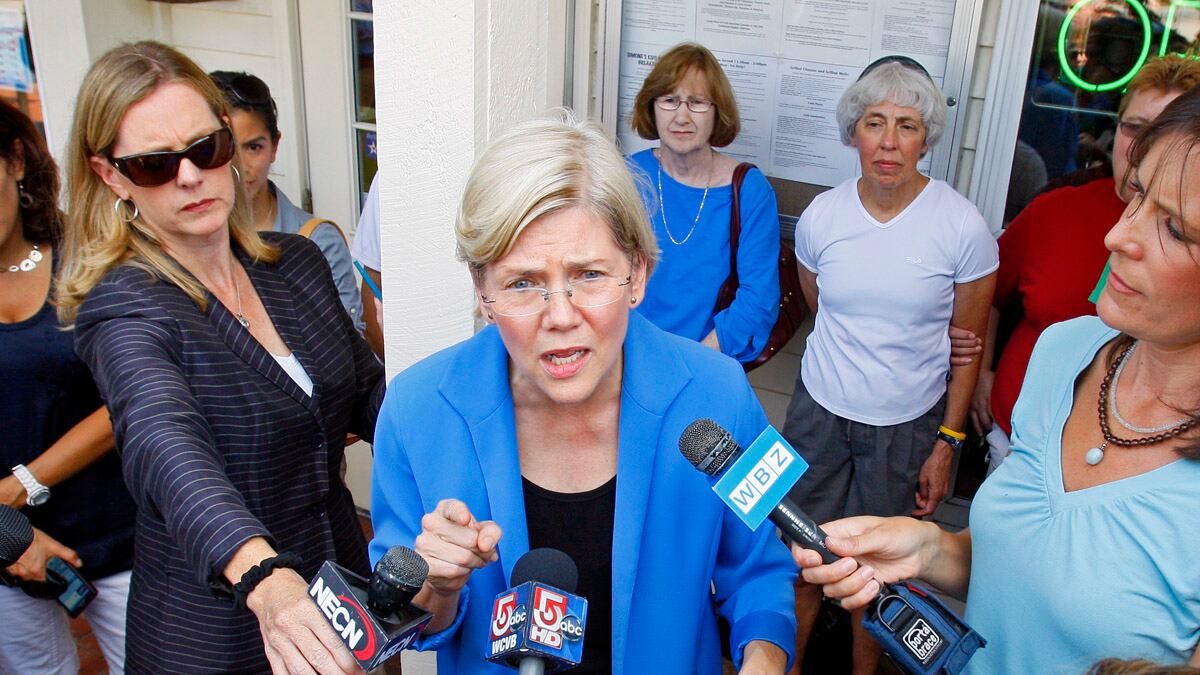Consumer champion Elizabeth Warren will first have to win her party’s nomination for the Senate in Massachusetts, but that’s considered little more than a formality. The other announced candidates are either bowing out or will soon discover they’re no match against Warren, a political celebrity who Democrats believe has the moxie and the money to evict Scott Brown from the Senate seat long held by Ted Kennedy.
The Democrats are exuberant that Warren, passed over by President Obama to head the consumer protection bureau she helped create, has agreed to jump into the race. She’s never run for public office before, but has a huge following among progressives for her willingness to stand up against the banks and financial institutions. A familiar presence on cable television, she is expected to pull in money from across the country in what will be billed as a marquee race between two political powerhouses.
Brown can easily hold his own in any celebrity faceoff, having swept into office last year with his barn coat and pickup truck becoming symbols of his Everyman’s appeal. A recent Boston Globe poll showed him the most popular politician in a state where he is the only Republican in the congressional delegation. Political handicapper Stu Rothenberg calls a Brown-Warren contest a tossup that tilts toward Brown mostly because he’s a known quantity. “Someone who’s never been a candidate before, some are naturals and have great political instincts. Others have a long learning period and make mistakes; sometimes they never learn,” he says. “In that regard, she is a question mark.”
Rothenberg says he had the same reservations about Brown until he saw him perform. “Smooth as silk,” he says. “She has more to prove.”
Even before Warren announced, Brown’s team registered the website “Queen Elizabeth Warren” as part of their effort to set up a contrast between the freshman’s down-home image and the “liberal Harvard professor from Oklahoma.” Warren has spent her academic and professional life researching and fighting and against big-money special interests, and she is deeply rooted in the middle class as the daughter of an Oklahoma City carpet salesman.

Still, ingrained perceptions are hard to change. Warren’s announcement comes the day after a special election for Anthony Weiner’s New York City seat, where Democrats lost despite a 3-to-1 advantage in party registration. A chief reason for the upset is the disaffection of white working-class voters over the ailing economy.
It was a shock for Democrats when Brown won the special election in January 2010 to fill the remainder of Kennedy’s term. Massachusetts has long been seen as one of the bluest states in the country, the only one carried by George McGovern in 1972. But fissures have been appearing for some time with white working-class voters, many of them Roman Catholic, moving into the GOP camp.
Call them independents, or moderates; they’re the ones who will likely decide the race between Brown and Warren.
Democrats will try to tie Brown to the Tea Party, which helped propel him into office. But Brown angered his Tea Party supporters by crossing the aisle to support such Democratic initiatives as ending the ban on gays serving openly in the military with his vote against the Don’t Ask, Don’t Tell policy. “Brown was a blank slate last time, now he’s got a record,” says Matt Bennett with the centrist Democratic group, Third Way. And that record should help Brown reach out beyond the Republican base, which in Massachusetts is infinitesimal, says Rothenberg. “He’s going to have to get independents and some Democrats. The arithmetic is hard, but not impossible.”
Brown may have won a special election against a weak candidate in Martha Coakley, but next year he’ll be running in a state where Obama is likely to carry 60 percent of the vote. “That’s a state we should be able to win with someone who’s got a profile, and she’s got it,” says Bennett. “She’s definitely going to have an energizing effect on the base and that’s good, but Massachusetts is not made up of Harvard liberals and Volvo-driving Newtonians,” as in Newton, Mass.
A contest between Warren and Brown is a microcosm of the much bigger fight for the hearts and minds of voters who aren’t automatic partisans.






